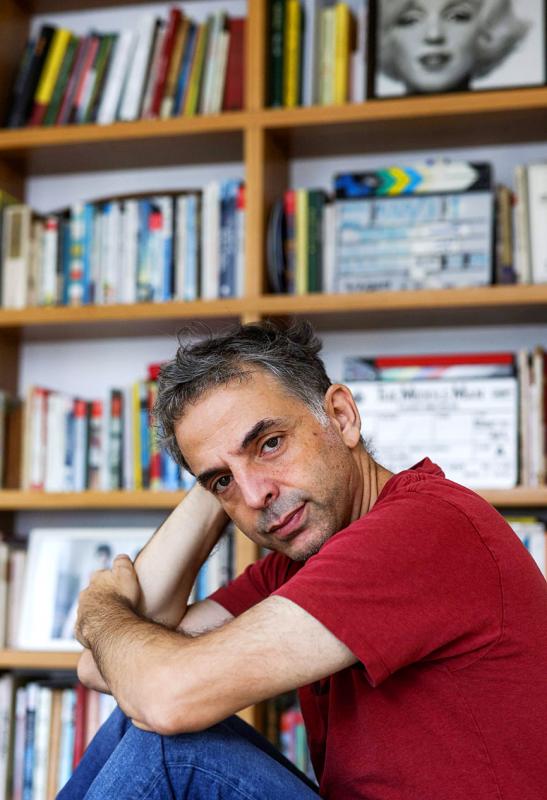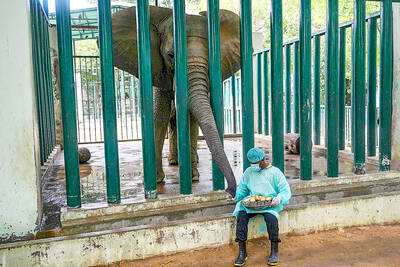Etgar Keret, one of Israel’s most popular living writers, said that the COVID-19 pandemic has brought him a lot of inspiration and he chides those inclined to romanticize the pre-pandemic world.
The 53-year-old, who often speaks with a playful smile and is known for his dark, biting humor, has recently published stories in The New York Times Magazine and The New York Review of Books exploring the pandemic’s impact on humanity.
Speaking about his virus-driven creative flourish, Keret said: “Life typically consists of a series of actions dictated by compulsive behavior that pushes us to do the same thing over and over. Coronavirus has broken this force of inertia.”

Photo: AFP
“It’s like a big slap in the face,” he said in an interview in his small, but bright Tel Aviv apartment. “Suddenly, we see more. Things we did not see before.”
Keret, whose stories have been widely translated and published in dozens of countries, said that while much of the world had been brought to a standstill, he was enjoying one the “most prolific” periods of his life.
At the entrance to his home is a small black-and-white photograph of his mother, a survivor of the Nazi Warsaw Ghetto who died several years ago, and a poster of his 2007 film Jellyfish, which he directed with his wife, Shira Geffen.
It won the Best First Feature award at the Cannes Film Festival that year, boosting Keret’s international profile.
Reflecting on his surge in output during the pandemic, Keret recalled his father, also a Holocaust survivor.
“My father used to say that even if obviously he preferred the easy times, we learn the most about ourselves in difficult times and, in hindsight, those times are the most interesting,” Keret said.
Keret rejected what he described as the “victim narrative” adopted by some artists who muse on “how much better life was before” the pandemic.
His recent writing has explored the loneliness and isolation felt by many, but in counterintuitive ways.
Outside, published by The New York Times Magazine in July, portrays a society not entirely keen on being freed from a government-imposed lockdown.
In the short story, people have gotten used to not going to work, forgotten what they did for a living or cannot remember basic etiquette for walking down the street.
With citizens clearly preferring to stay home, the army and police go door-to-door to force them outside.
In the end, the narrator takes comfort in remembering that one is supposed to quickly pass and avoid eye contact with a homeless person begging for food.
“I don’t think we had a perfect world that was taken from us,” Keret said. “Now we perhaps have a chance to improve it.”
Outside was adapted into a short film that was screened in Tel Aviv, New York’s Times Square and the Shibuya pedestrian crossing in Tokyo.
In Eating Olives at the End of the World, published by The New York Review of Books in April, a supermarket cashier is so distressed by her separation from her grandson that she refuses to accept money from the narrator as payment for a jar of pimento-stuffed olives.
Desperate for the last available item on the pickle shelf, the narrator offers to pay above the asking price.
The story says: “’A hug,’ the tearful cashier interrupted me and spread her arms out. ‘It’ll cost you a hug.’”
Keret said that the sources of his inspiration “are always negative.”
“I write when I am anxious, when I am bored, when I am angry,” he said. “When the going is crappy, like now with coronavirus and all the anxiety, frustration and uncertainty it brought. This is when I think of a joke or story.”
“For me, humor and creativity are like the airbags in a virtual car. Writing is not the goal of my life. It is the best way I have found to face it,” he said.

NO EXCUSES: Marcos said his administration was acting on voters’ demands, but an academic said the move was emotionally motivated after a poor midterm showing Philippine President Ferdinand Marcos Jr yesterday sought the resignation of all his Cabinet secretaries, in a move seen as an attempt to reset the political agenda and assert his authority over the second half of his single six-year term. The order came after the president’s allies failed to win a majority of Senate seats contested in the 12 polls on Monday last week, leaving Marcos facing a divided political and legislative landscape that could thwart his attempts to have an ally succeed him in 2028. “He’s talking to the people, trying to salvage whatever political capital he has left. I think it’s

Polish presidential candidates offered different visions of Poland and its relations with Ukraine in a televised debate ahead of next week’s run-off, which remains on a knife-edge. During a head-to-head debate lasting two hours, centrist Warsaw Mayor Rafal Trzaskowski, from Polish Prime Minister Donald Tusk’s governing pro-European coalition, faced the Eurosceptic historian Karol Nawrocki, backed by the right-wing populist Law and Justice party (PiS). The two candidates, who qualified for the second round after coming in the top two places in the first vote on Sunday last week, clashed over Poland’s relations with Ukraine, EU policy and the track records of their

UNSCHEDULED VISIT: ‘It’s a very bulky new neighbor, but it will soon go away,’ said Johan Helberg of the 135m container ship that run aground near his house A man in Norway awoke early on Thursday to discover a huge container ship had run aground a stone’s throw from his fjord-side house — and he had slept through the commotion. For an as-yet unknown reason, the 135m NCL Salten sailed up onto shore just meters from Johan Helberg’s house in a fjord near Trondheim in central Norway. Helberg only discovered the unexpected visitor when a panicked neighbor who had rung his doorbell repeatedly to no avail gave up and called him on the phone. “The doorbell rang at a time of day when I don’t like to open,” Helberg told television

A team of doctors and vets in Pakistan has developed a novel treatment for a pair of elephants with tuberculosis (TB) that involves feeding them at least 400 pills a day. The jumbo effort at the Karachi Safari Park involves administering the tablets — the same as those used to treat TB in humans — hidden inside food ranging from apples and bananas, to Pakistani sweets. The amount of medication is adjusted to account for the weight of the 4,000kg elephants. However, it has taken Madhubala and Malika several weeks to settle into the treatment after spitting out the first few doses they